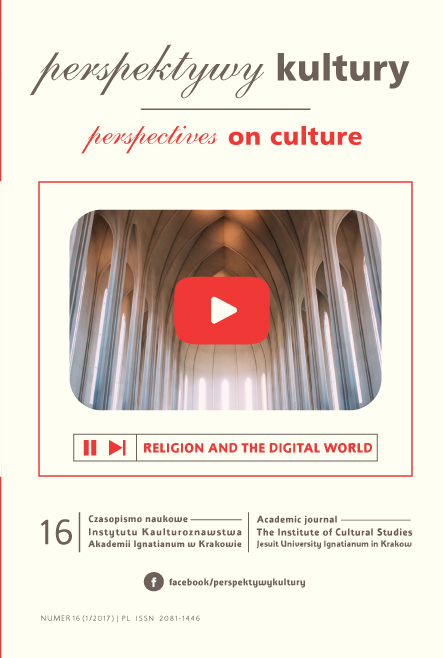Kultura filozoficzna w wybranych środowiskach nowych mediów
Abstrakt
Kultura filozoficzna stanowi środowisko umożliwiające powstanie re lacji dialogicznej między mistrzem i uczniem. Istotnym elementem tego fenomenu jest również możliwość powstania wspólnoty ludzi równych i wolnych, dla których głównym celem życiowym jest dąże nie do prawdy. Ze względu na presję ekonomiczną współcześnie trud no jest znaleźć taką przestrzeń.
W pierwszym punkcie została przedstawiona charakterystyka kul tury filozoficznej. W drugiej części zaprezentowano próbę wykreo wania takiego środowiska w Internecie. Jest to Academia Electronica, która jest jednostką zajmującą się edukacją filozoficzną w przestrzeni Second Life.
Jest to miejsce, gdzie każda osoba może bezinteresownie podzielić się swoją wiedzą filozoficzną. Ma ono znaczną wartość dla budowa nia kultury filozoficznej. W trzeciej części wskazałem, że ogranicze niem tego środowiska jest brak bezpośredniej obecności. Z tego po wodu nie może tutaj powstać relacja dialogiczna, w której zachodzi przekaz wartości egzystencjalnych.
Bibliografia
BRANICKI Wacław. 2011. Awatar jako wirtualne ucieleśnienie lub sztuczna tożsamość. W Paradoksy internetu. Konteksty społeczno‑kulturowe, M. Szpu nar (red.), s. 87‑103. Toruń: Wydawnictwo Adam Marszałek.
BOELLSTORFF Tom. 2012. Dojrzewanie w Second Life. Antropologia czło‑ wieka wirtualnego. Tłum. Agata Sadza. Kraków: Wydawnictwo Uniwer sytetu Jagiellońskiego.
ELIOT Thomas Stearns. 2007. Chrześcijaństwo, kultura, polityka. Tłum. Piotr Kimla. Warszawa: Wydawnictwa Uniwersytetu Warszawskiego.
GADAMER Hans‑Georg. 2000. Rozum, słowo, dzieje. Tłum. Małgorza ta Łukasiewicz, Krzysztof Michalski. Warszawa: Państwowy Instytut Wydawniczy.
HADOT Pierre. 2000. Czym jest filozofia starożytna?. Tłum. Piotr Domański. Warszawa: Aletheia.
LEVINAS Emmanuel. 1998. Całość i nieskończoność. Tłum. Małgorzata Ko walska. Warszawa: Wydawnictwo Naukowe PWN.
MOLKA‑DANIELSEN Judith. 2009. The New learning and Teaching En‑ vironment, W Learning and Teaching in the Virtual World of Second Life, J. Molka‑Danielsen, M. Deutschmann (red.), s. 13‑25. Trondheim: Tapir Academic Press.
MYOO Sidey (Ostrowicki Michał). 2013. Ontoelektronika. Kraków: Wydaw nictwo UJ, Kraków 2013.
PLESZCZYŃSKI Jan. 2013. Epistemologia komunikacji medialnej. Perspekty‑ wa Ewolucyjna. Lublin: Wydawnictwo UMCS.
STRÓŻEWSKI Władysław. 2013. Logos, wartość, miłość. Kraków: Wydawni ctwo Znak.
WĘGRZECKI Adam. 2014. Wokół filozofii spotkania. Kraków: WAM.
Copyright (c) 2017 Akademia Ignatianum w Krakowie

Utwór dostępny jest na licencji Creative Commons Uznanie autorstwa – Bez utworów zależnych 4.0 Międzynarodowe.
Autor, zgłaszając swój artykuł, wyraża zgodę na korzystanie przez Wydawnictwo Uniwersystet Ignatianum z utworu na następujących polach eksploatacji:
- utrwalania utworu w formie papierowej, a także na nośniku cyfrowym lub magnetycznym;
- zwielokrotnienia utworu dowolną techniką, bez ograniczenia ilości wydań i liczby egzemplarzy;
- rozpowszechniania utworu i jego zwielokrotnionych egzemplarzy na jakimkolwiek nośniku, w tym wprowadzenia do obrotu, sprzedaży, użyczenia, najmu;
- wprowadzenia utworu do pamięci komputera;
- rozpowszechniania utworu w sieciach informatycznych, w tym w sieci Internet;
- publicznego wykonania, wystawienia, wyświetlenia, odtworzenia oraz nadawania i reemitowania, a także publicznego udostępniania utworu w taki sposób, aby każdy mógł mieć do niego dostęp w miejscu i czasie przez siebie wybranym.
Wydawca zobowiązuje się szanować osobiste prawa autorskie do utworu.





